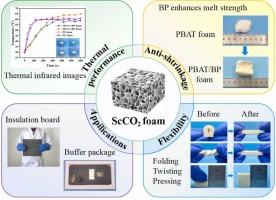Highly resilient PBAT foams fabricated by bamboo powder limiting strategy using supercritical CO2 foaming
IF 6.2
1区 农林科学
Q1 AGRICULTURAL ENGINEERING
引用次数: 0
Abstract
High-performance Poly (butylene adipate-co-butylene terephthalate) (PBAT) foam holds significant potential for application in packaging, construction and other sectors, but it has the problems of high shrinkage rate and poor resilience. In this study, highly resilient PBAT/bamboo powder (BP) foams were produced using the supercritical carbon dioxide (scCO2) foaming technique, with BP as the reinforcement material. A systematic investigation was conducted to assess the effects of BP content and foaming conditions on foam properties. In addition, the mechanism of enhancement of foam's resistance to shrinkage using BP limiting strategy were elucidated. When the content of BP was 15 wt%, the foaming temperature was 100 ℃, and the foaming pressure was 12 MPa, the foaming ratio of the foam was 10.11 times, the density was 0.13 g/cm³ , and the shrinkage rate was significantly reduced from 68.57 % of pure PBAT to 5.24 % (a substantial reduction of 92.36 %). BP enhances the melt strength of PBAT and acts as the heterogeneous nucleation site to increase cell density, achieving synergistic resistance for foam shrinkage. The PBAT/BP foams exhibited outstanding resilience (can recover the original state after being folded, twisted, or compressed). Additionally, the prepared PBAT/BP foams showed similar thermal conductivity 28.85 mW/(m·K) to commercial polyurethane (PU) and polystyrene (PS) foams, offering ideal substitutes for fossil-based foams. This study offers a broadly applicable strategy for the production of shrinkage-resistant, heat insulating, and resilient biodegradable polyester foams.

超临界CO2发泡竹粉限位策略制备高弹性PBAT泡沫
高性能聚己二酸丁二酯-对苯二甲酸丁二酯(PBAT)泡沫在包装、建筑等领域具有很大的应用潜力,但存在收缩率高、回弹性差的问题。本研究采用超临界二氧化碳(scCO2)发泡技术制备了高弹性PBAT/竹粉(BP)泡沫,BP为增强材料。系统考察了BP含量和发泡条件对泡沫性能的影响。此外,还阐明了BP极限策略增强泡沫抗收缩性能的机理。当BP含量为15 wt%,发泡温度为100℃,发泡压力为12 MPa时,泡沫的发泡比为10.11倍,密度为0.13 g/cm³ ,收缩率由纯PBAT的68.57 %显著降低至5.24 %(大幅降低92.36 %)。BP提高了PBAT的熔体强度,并作为非均相成核位点增加细胞密度,达到协同抵抗泡沫收缩的目的。PBAT/BP泡沫具有优异的弹性(可在折叠、扭曲或压缩后恢复原始状态)。此外,制备的PBAT/BP泡沫的导热系数为28.85 mW/(m·K),与商用聚氨酯(PU)和聚苯乙烯(PS)泡沫相似,是化石基泡沫的理想替代品。本研究为生产抗收缩、隔热、弹性的可生物降解聚酯泡沫塑料提供了一种广泛适用的策略。
本文章由计算机程序翻译,如有差异,请以英文原文为准。
求助全文
约1分钟内获得全文
求助全文
来源期刊

Industrial Crops and Products
农林科学-农业工程
CiteScore
9.50
自引率
8.50%
发文量
1518
审稿时长
43 days
期刊介绍:
Industrial Crops and Products is an International Journal publishing academic and industrial research on industrial (defined as non-food/non-feed) crops and products. Papers concern both crop-oriented and bio-based materials from crops-oriented research, and should be of interest to an international audience, hypothesis driven, and where comparisons are made statistics performed.
 求助内容:
求助内容: 应助结果提醒方式:
应助结果提醒方式:


